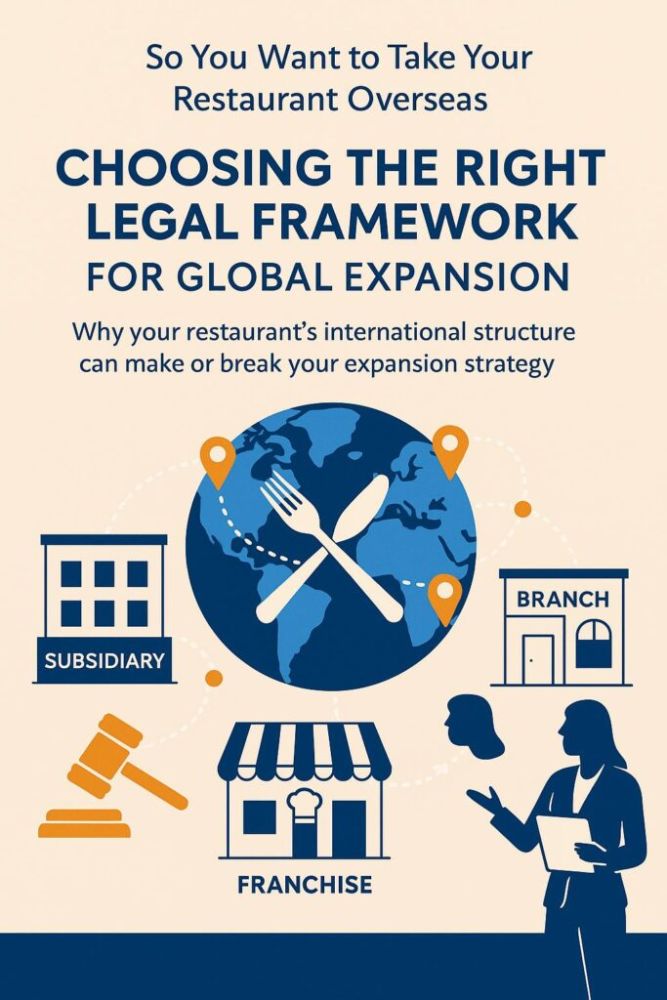- within Corporate/Commercial Law topic(s)
- with Finance and Tax Executives
- with readers working within the Accounting & Consultancy industries

So You Want to Take Your Restaurant(s) Overseas
Choosing the Right Legal Framework for Going Global
Expanding your restaurant internationally is more than a growth strategy—it's a major leap that tests every part of your business, from operations and supply chains to culture, finance, and of course, law. It's easy to get swept up in the excitement of new markets and emerging culinary scenes, but international expansion is not just about translating your brand into a new language or replicating your menu abroad. It's about understanding and complying with a new legal ecosystem, managing risk, structuring your business intelligently, and ensuring your intellectual property survives the journey intact.
Choosing the Right Legal Structure: Subsidiary, Branch, or Franchise
Choosing the right legal structure—whether a subsidiary, branch, or franchise—is a foundational decision that will affect your tax liability, operational control, and regulatory obligations for years to come. While subsidiaries offer strong liability protection and control, branches provide flexibility for market testing, and franchising enables rapid expansion with lower capital investment. But each structure carries its own legal requirements and risks, which can vary significantly across jurisdictions. Understanding these differences up front is critical to avoiding costly missteps that could undermine your global growth strategy.
As a lawyer who has worked in cross-border business development, I've seen the full range of legal pitfalls and procedural complexities that companies—especially in the hospitality industry—encounter when expanding internationally.
What This Series Covers
In this blog series, we'll move beyond generic checklists to explore the legal substance of what international expansion really requires—while also weaving in the operational and strategic considerations that must align with the legal framework you build.
Whether you're taking your first steps abroad or looking to solidify a presence already in motion, this six-part series will equip you with the legal insight to move with confidence and foresight, by covering:
- Part 1: Legal Considerations for Structuring Your Restaurant Abroad
- Part 2: Navigating Regulatory, Licensing, and Financial Requirements
- Part 3: Employment, Data Privacy and Consumer Protection
- Part 4: Intellectual Property Considerations
- Part 5: Real World Nuances in Law and Application
- Part 6: How to Use Legal Counsel When Expanding Internationally
We'll begin with the foundational decision every global restaurant operator must make: how to structure your international presence.
Legal Considerations for Structuring Your Restaurant Abroad
There is a reason we start our series with this topic – the legal form your international presence takes is one of the most important and foundational decisions you will make. It affects your tax exposure, liability, control, regulatory obligations, and the ability to scale overtime. There are three main legal structures most restaurants consider when entering a new country: wholly owned subsidiaries, branch offices, and franchises. Each comes with legal tradeoffs and jurisdictional nuances.
1. Subsidiaries
A subsidiary is a separate legal entity incorporated under the laws of the host country. The parent company typically owns 100 percent of the shares, giving it full control over operations.
Pros
- Limited liability: The parent company is generally shielded from the subsidiary's debts and legal liabilities (unless specific guarantees are made or local "piercing-the-corporate-veil" doctrines apply).
- Operational control: Full equity ownership gives the parent company the ability to implement its brand, systems, and culture consistently across locations.
- Market credibility: In some countries, having a locally incorporated entity may enhance legitimacy with regulators, landlords, and banks.
Common Challenges
- Capital and corporate governance requirements: Many countries impose minimum capitalization thresholds and may require a board with local residents.
- Administrative burdens: You may face unfamiliar reporting obligations, audits, and tax filings—often with stricter timelines and formats than your home country.
- Banking delays: Even basic steps like opening a business bank account or securing a tax ID can take weeks—or longer—depending on bureaucracy and financial regulations.
Key Jurisdictional Variables
- Local directorship rules: Some countries require that a certain number of directors be local citizens or residents.
- Tax treatment: Tax rules vary significantly. Some countries offer tax incentives to foreign investors; others impose additional taxes on repatriated profits.
- Regulatory oversight: Certain jurisdictions impose heightened scrutiny on foreign-owned entities, especially in the food and beverage sector, where health and consumer laws are strictly enforced.
For instance, in Germany, the GmbH (Gesellschaft mit beschränkter Haftung), a common form of limited liability company, requires a minimum share capital of €25,000 to be fully or partially paid up at the time of registration. This upfront capital commitment can be a crucial consideration for budget planning.
2. Branches
A branch is not a separate legal entity but rather an extension of the parent company operating in the host country.
Pros
- Simplified formation: Establishing a branch is generally faster and less bureaucratic than incorporating a subsidiary.
- Operational flexibility: May be suitable for short-term or low-risk market entries such as pop-ups, seasonal locations, or market testing.
Common Challenges
- Increased liability: Because a branch is legally part of the parent company, liabilities incurred abroad can flow back to the parent.
- Tax exposure: Profits are typically taxable in the host country and may also be subject to withholding taxes or double taxation if no treaty applies.
- Regulatory hurdles: Branches often must register with local authorities, file reports, and appoint a local representative, which still creates ongoing obligations.
When Branches Make Sense
- Short-term market presence: For example, testing viability in a new city or hosting a temporary branded activation.
- Lower-risk environments: Where liability risks, enforcement concerns, or customer exposure are minimal.
- Treaty protections: In countries where a tax treaty exists and offers favorable treatment for foreign branches.
Years ago, we worked with an American company looking to break into the European market. Initially, they leaned towards a branch structure, drawn by the perceived simplicity of the setup.
However, after deeper consultation, they discovered that local regulations in their target country held the parent company directly liable for all debts and obligations of the branch, a risk far exceeding their comfort level. Ultimately, they opted for a subsidiary, accepting the more complex initial setup for the crucial layer of liability protection it afforded. This real-world scenario underscores how the seemingly easiest path isn't always the safest or most strategic in the long run.
3. Franchises
Franchising enables market entry with relatively low capital investment and without direct operational control. But the legal complexity of international franchising is substantial.
Pros
- Rapid expansion: Franchisees bear the cost and operational burden of setting up new locations.
- Local market expertise: Franchisees often bring valuable knowledge of the regulatory, cultural, and consumer landscape.
- Brand presence without direct liability: In theory, the franchisee is responsible for compliance and operations.
Common Challenges
- Complex legal framework: Many countries require registration of the franchise offer, disclosure documents, and detailed franchise agreements that meet local law.
- Enforceability issues: Clauses common in U.S. franchise contracts—such as non-competes, territorial exclusivity, or royalty structures—may not be enforceable abroad.
- Brand risk: A franchisee's non-compliance with local laws (e.g., health, employment, or consumer regulations) can still damage your brand, even if you're not directly liable.
Jurisdictional Nuances
- Disclosure requirements: Countries like France, Australia, and Brazil impose strict pre-contractual obligations. Skipping these can void a contract.
- Registration mandates: Some jurisdictions require government registration before any franchise activity can occur.
- Dispute resolution: Enforcing franchisor rights in another country can be difficult and time-consuming—especially without localized contracts and dispute mechanisms.
France's Loi Doubin (or Doubin Law, named after the Minister who formulated it) mandates that franchisors provide prospective franchisees with a detailed disclosure document (Document d'Information Précontractuelle or DIP) at least 20 days before the signing of the franchise agreement. Failure to comply with these pre-contractual obligations can render the franchise agreement null and void.
Dispute Resolution and Governing Law
When drafting contracts with local partners, landlords, vendors, or franchisees, you must decide how disputes will be resolved. Your instinct may be to default to your home jurisdiction and court system, but this may not be enforceable or practical.
Arbitration is often the preferred method of resolving international commercial disputes. It offers neutrality, flexibility, and enforceability under the New York Convention on the Recognition and Enforcement of Foreign Arbitral Awards. However, you must still determine the arbitration forum, language, and governing law.
In addition, enforceability of U.S. judgments in foreign jurisdictions is not guaranteed. You should review whether the host country recognizes foreign judgments or requires a local judgment before enforcement is possible.
Conclusion
Choosing the right legal structure is the cornerstone of a successful international expansion. Taking your restaurant overseas is an ambitious and potentially transformative decision. But it's also a legally intensive one. The success of your international venture will depend not only on your brand's appeal and your culinary vision, but on the quality of your legal structuring, regulatory compliance, intellectual property strategy, and contract enforcement mechanisms.
Working with legal counsel who understands both the domestic and international dimensions of your business is not optional—it is essential. A well-crafted holistic strategy can prevent months of delay, protect your assets, and preserve the integrity of your operations abroad.
International expansion is a legal challenge disguised as a business opportunity. Treat it that way, and you will be far better positioned to thrive in a new market.
This first part of our series has laid the groundwork by exploring the crucial legal considerations for structuring your restaurant abroad. In tomorrow's Part 2, we will navigate the often-complex regulatory, licensing, and financial requirements you'll encounter in new markets.
To view the original article click here
The content of this article is intended to provide a general guide to the subject matter. Specialist advice should be sought about your specific circumstances.



